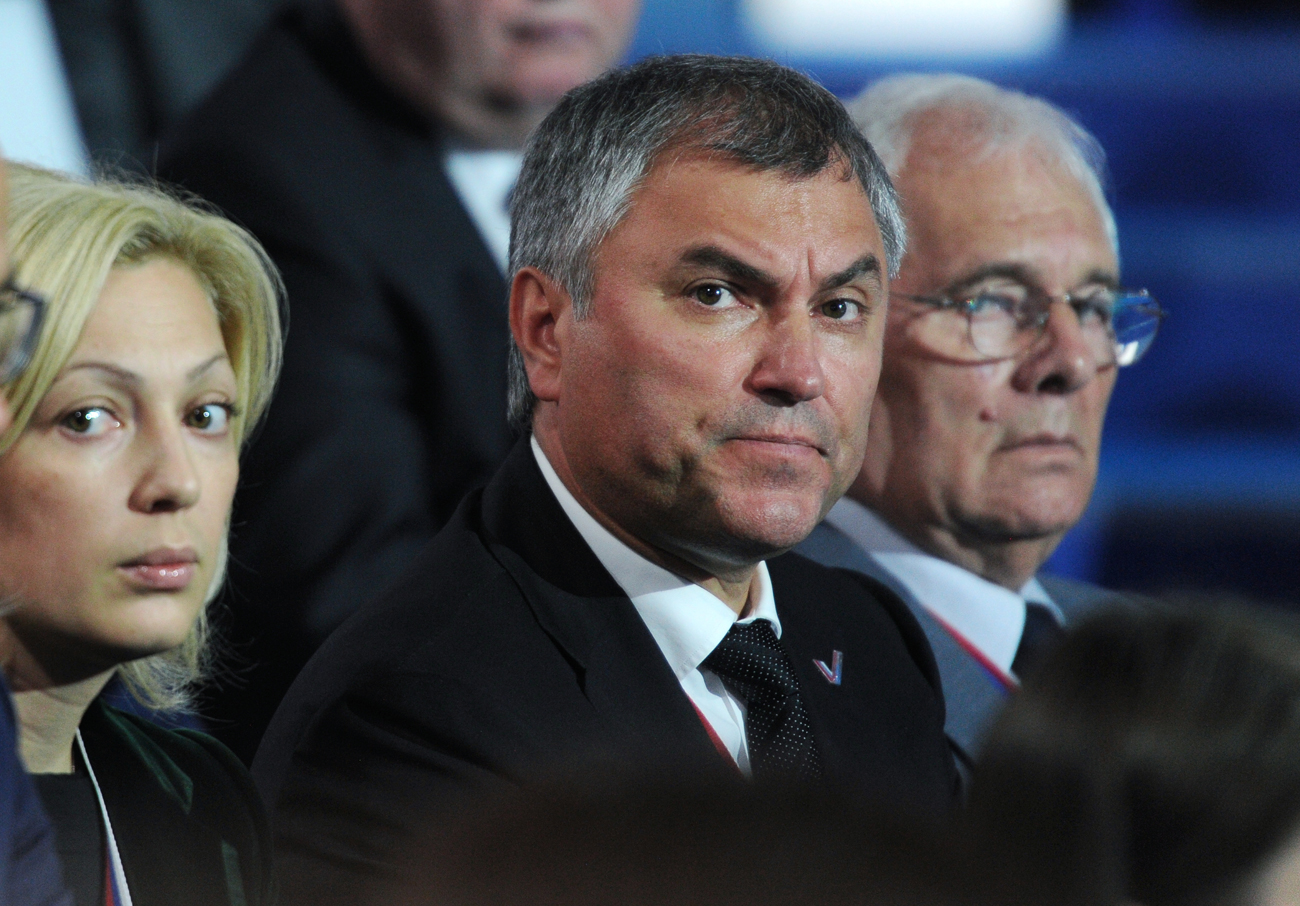
A total of 404 out of 449 lawmakers backed Vyacheslav Volodin's candidacy for a position of Russia's State Duma speaker.
Ria NovostiAt its first meeting on Oct. 5, Russia's newly elected State Duma voted Vyacheslav Volodin as its speaker. A total of 404 out of 449 lawmakers backed Volodin, while 40 deputies supported his rival, Dmitry Novikov of the Communist Party of Russia.
Before his election as Duma speaker, Volodin had served as the first deputy chief of staff of the Presidential Administration in charge of the nation’s domestic policy. In short, he was the “regime’s architect,” according to the analytical website Russia Direct. Volodin coordinated state ideology, managed elections, lobbied for specific pieces of legislation and “cleaned up” Russia after the Bolotnaya protests in Moscow in 2011-2012, which erupted after allegations of vote-rigging in the December 2011 State Duma elections.
Rumors about Volodin’s move to the Duma had been circulating for some time, and they escalated when Putin appointed previous State Duma speaker Sergei Naryshkin as the head of Russia’s Foreign Intelligence Service.
Experts expect Volodin to be much more of a visible, hands-on presence within the Duma than his predecessors. Boris Gryzlov, Duma speaker from December 2003-December 2011, famously said “the Duma is not a place for discussions,” and during Naryshkin’s tenure, the body was given the nickname “the Mad Printer” because of the speed at which it passed restrictive laws backed by the Kremlin.
Volodin is used to being a role where he could act decisively and firmly, traits that he might bring to bear on the Duma’s operations. “Undoubtedly, Volodin will be a more heavy-handed speaker in the Duma than his predecessors,” said Evgeny Minchenko, director of the International Institute for Political Expertise.
Volodin is far from an unknown quantity. He has served in all branches of the government, beginning in 1991, when he was elected to the Saratov city Duma; he later became its deputy chair. In 1996, Volodin became deputy governor of the Saratov region and three years later, he became a member of the State Duma and the leader of the parliamentary group “Fatherland – All Russia,” one of the parties that later combined to form United Russia. Volodin was reelected to the Duma in 2003 and 2007.
He joined the administration in 2010 as a deputy prime minister and chief of staff of the government (the branch under the control of the Prime Minister, not to be confused with the presidential administration). The next year, however, he moved to the presidential administration, replacing first deputy chief of staff Vladislav Surkov.
Putin noted Volodin’s experience in the Duma in his announcement of the candidacy. “Prime Minister [Dmitry] Medvedev and I will ask [United Russia] to support the candidacy of Vyacheslav Volodin," said Putin, addressing representatives of the parties seated in the Duma. "He knows what parliamentary work is; he was a deputy himself for a long time, and while in the Presidential Executive Office, he maintained direct contacts with the deputy corps, the factional leaders and with the parties. This was part of his professional duties. I hope all of this will help him to manage the work in the lower house of parliament."
The reasons behind Volodin’s selection are not clear. Observers have speculated that the Kremlin wants to demonstrate that the Duma is working as a governmental body in its own right ahead of presidential elections in 2018 — and part of this speculation involves Volodin’s future.
Although it is widely assumed that Putin will run for another term, he has not yet given a definite answer as to whether or not he will take part in the vote, and the recent political shakeup within the government could suggest that the search for a successor is underway.
In a recent interview with Bloomberg, Putin described Volodin as “young but mature.” Anton Vaino, who recently replaced Sergei Ivanov as the head of the Presidential Administration, has also been mentioned as a potential candidate.
Volodin’s qualifications for the role are well known, but if he aspires to become the next president of Russia, he will need to use his position in the Duma to show that he can capture the hearts and minds of the voters and the media.
This article has been abridged. The full version was written specially for Russia-Direct by Ekaterina Grobman, a reporter for Kommersant daily.
Russia Direct is an international analytical media outlet with the focus on foreign policy. Its premium services, such as monthly analytical memos and quarterly white papers, are free but available for subscribers only. For more information about the subscription, please visit russia-direct.org/subscribe.
All rights reserved by Rossiyskaya Gazeta.
Subscribe
to our newsletter!
Get the week's best stories straight to your inbox